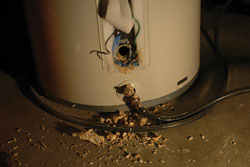As homeowners, it is easy to forget about the components that heat, cool and comfort us throughout the year. We forget, until they break down. Space heaters and sweaters help when the furnace calls it quits; fans and ice water can combat heat when our central air goes kaput. But unless you have a hot tub nearby, you’re stuck with freezing showers when the water heater fails.
Water heaters come in many shapes and sizes, and are powered by a variety of fuels. Depending on your house and your family’s needs, a specific kind of water heater may be better than others. We’ll take a look at a few common designs, and will share some troubleshooting tips should your device ever let you down. We know how miserable cold showers can be, so call Mister Quik as soon as you experience a problem with your water heater or any home comfort equipment.
Types of Water Heaters
While there are many types of water heaters, including solar powered and geothermal systems, we’ll focus on two of the most common appliances found in homes today. These include:
- Conventional water heaters
- Tankless water heaters
Most people rely on conventional water heaters in their homes. These units feature a large tank that stores heated water. Conventional water heaters are often found in basements, garages and utility closets. They are more affordable, with tanks that range in size from 10 gallons to 50 gallons or more.
Tankless water heaters, like the name implies, do not rely on a storage tank of heated water. Instead, these systems heat the water as it passes through the device. Typically, tankless water heaters are more expensive to buy, but their smaller size and higher efficiency is attractive to many consumers.
Both kinds of water heaters need a fuel source to warm all that water. The two most common fuels are:
We’re not talking about gasoline. Rather, natural gas is most often used as a water heater fuel. Natural gas needs to be vented for safety, and utility prices can fluctuate. One major benefit to gas water heaters, is that they continue to work even if the power goes out.
Electric water heaters are efficient and can heat up water very quickly. Maintenance concerns are generally low, and electricity tends to cost less than natural gas depending on use. However, if the power ever goes out at home, hot water goes with it.
Depending on the type of water heater and the fuel it uses, owners will see a difference in the amount of cleaning required, along with recovery times (how fast a system can heat water after heavy use) and other considerations. Talk to Mister Quik about your specific needs, and we’ll help you choose a system that works best for your home.
Common Water Heater Problems
Water heaters, like every mechanical appliance and system in a home, have a fixed lifespan and will need to be replaced at some point. Problems do occur, and should be diagnosed and repaired as soon as possible to avoid even bigger issues. Common water heater problems include:
- Loss of hot water
- Water too hot
- Dirty or smelly water
- Pilot light out (gas heaters only)
- Water leaks
- Rumbling or other strange noises
Before you attempt to do any troubleshooting or maintenance on your own, make sure your water heater is safely and properly shut down. Turn off all electric and gas connections, and turn off the water supply to the unit.
Water heaters are designed for efficiency, but they are complex systems that shouldn’t be tampered with unless you know what you are doing. Play it safe and avoid causing more problems. Just call Mister Quik and we’ll send a professional repairman to your home, day or night.
In addition to scheduled maintenance and emergency repairs, Mister Quik also sells and installs all major brands and types of water heaters. Talk to a member of our sales team today, and ask us about current sales and incentives on new equipment. In the meantime, enjoy those hot showers on these cold Indiana days.







